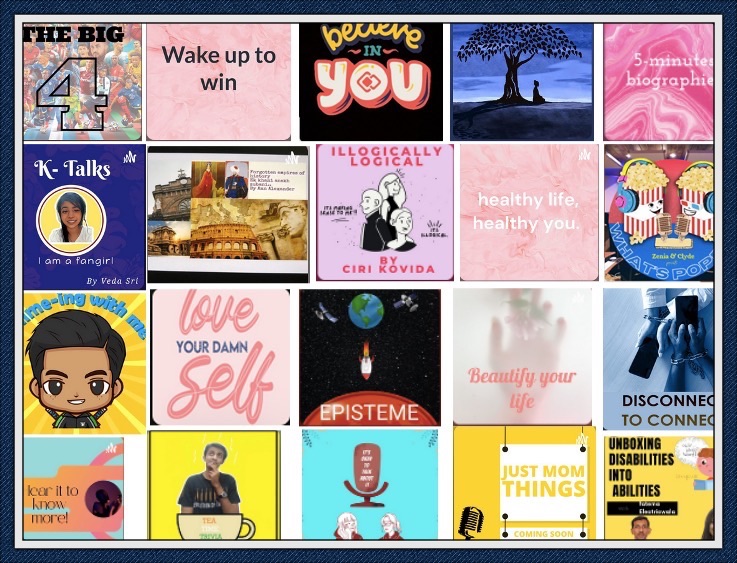Podcasting has been around for more than a decade, but it was more popular in the West. More Indians started listening to podcasts during the pandemic. Consumption of streaming content also grew during the pandemic months as avenues for outdoor entertainment were limited. Watching movies via OTT channels, for instance, replaced movies in theaters, which remained shut due to lockdowns. Like OTT, demand for podcasts also soared. According to a Spotify study (Wrapped Campaign 2020), there was a 1,100 percent year-on-year growth for Hindi podcasts on Anchor (a hosting platform owned by Spotify). The same study shows that nearly two-thirds of the respondents wanted more time for activities like general entertainment, relaxation, or learning new things. So, podcasts help listeners relax. A podcast, if done right, can also be monetized, and marketers are willing to invest in podcasts that have the target audience. Yes, you can actually make serious money from podcasts. But first, you need to master certain aspects when planning your podcast channel. In this article, I will show you how to start a podcast, and discuss all the important aspects.
It’s Not Only About the Hardware
Many people start thinking about the hardware (equipment) they would need for setting up their podcasts. Others spend money on soundproofing materials to set up a home studio. All this is important, but you can make these investments later.
Some folks do podcasts using their smartphones. They invest in a lavalier mic (tie-clip microphone) and maybe a pop filter. That’s an investment of less than Rs 1,000 ($13). You can start using a free app (and platform) like Anchor. Download the Anchor app and set up your profile and channel. Anchor will even distribute your podcasts to other directories (apart from Spotify) and help you monetize your channel. There are built-in wave editing features and free music clips on offer too!
Some things are more important than hardware and software. Give this careful thought when planning your podcast channel and the episodes.
Before You Start a Podcast: Think Audience
You’ve probably heard of the maxim “content is king.” With podcasts (and videos), it is the audience that is king. It’s really about the numbers. The number of listens (plays) or downloads for your episodes. Sponsors and advertisers expect a certain number of listens every month. Among the first questions to ask is: Who is your audience?
Also, ask yourself these questions:
- What is the age group you are targeting?
- In which regions is this audience?
- How busy are they? How much time do they spend listening to podcasts?
- What are their interests?
- Are you targeting only females, males, or both?
- Students, working professionals, or retirees?
- What kind of information/knowledge does your audience want?
- What problem does your podcast solve?
- What structure or format do you want for your podcasts? (solo, interviews, co-presenter, panel, etc.)
- What do you want your podcast to achieve? (Brand promotion, followers, sponsorship, more sales/revenue for your products; selling a book, etc.)
But how will you know all this?
If you already have a decent following on social media, do a poll or survey and ask these questions. But if you do not have a good following, look at similar podcasts. Look at the comments and reviews posted by those audiences. Or check if the podcast presenter has a following on Instagram, Facebook, Linkedin, and Twitter. Study their following and then make notes. It may not answer all these questions, but you can begin with this and refine the audience as the number of listeners for your channel increases.
Of course, you could also talk to your friends and family members and get this information to build audience profiles.
LISTEN TO OUR PODCASTS
https://www.digitalcreed.in/podcast/
Podcast Topic and Theme
Of course, you also want to think about the channel theme and topics for the episodes. What title do you want to have for your podcast? How will this stand out among the tens of thousands of podcasts out there?
It comes down to your passion and interests and those of your target audience.
Spend some time thinking about this. Also, plan the content for your first few episodes. How will these episodes be linked? It’s like writing chapters for a book. Chapters follow a logical sequence. And that’s how it should be for podcast episodes.
Start writing titles, notes, and descriptions for your podcast channel as well as the episodes. Put these notes on the platform (Anchor) when producing your episodes.
Identify Guests to Interview
Do you want to go solo or interview guests in your episodes? If you are going solo, be convinced that you know your subject matter. Write detailed scripts.
If you want to interview guests, ensure that they have something of interest to say to your audience. While interviewing celebrities may seem like a long shot, you could interview book authors (who would happily oblige), practitioners, professionals, and entrepreneurs.
Always check their profiles and track records (on LinkedIn). If an agency approaches you to interview their client, ask for the profile.
They should have experience and knowledge on the topic. Perhaps they have been called to speak at events. They may have written papers or books on this topic. What are their academic credentials? How many years have they spent in the industry? Have they done interviews elsewhere? Have you read their interviews? Check out their published works.

Image credit: Woman photo created by freepik – www.freepik.com
Here are some tips for identifying guests to interview:
- Listen to other podcasts (identify guests and even presenters)
- Attend virtual events (identify good speakers)
- Social Media (LinkedIn, Facebook, Instagram, YouTube vloggers)
- Book authors (Amazon)
- Researchers
- Email them (praise them for their work!) Be genuine.
- Explain what you are doing with your podcast
Where Will You Host your Podcasts?
There are dozens of hosting platforms, but I’d recommend Anchor/Spotify for beginners. I use SoundCloud for my podcasts.
While some (like Anchor) offer free hosting, the others offer different plans and even let you try out their services for free, for a limited period.
A hosting provider:
- Stores your episodes on their server;
- Does processing and mastering;
- Distributes your episodes;
- Provides the RSS feed/link;
- Offers analytics and audience metrics.
Look out for these features in your hosting provider and ask these questions:
- Will they distribute your feeds to apps/directories like Spotify, Stitcher, Apple Podcast, etc.?
- Annual/monthly hosting plans
- Online recording, editing tools
- Do they offer an Analytics Dashboard? Audience metrics.
- Do they assist in the promotion of your podcast?
- Do they assist with monetization?
- How much storage space do they offer?
What Software Will You Need?
To record and edit podcasts on your computer, you will need to set up a Digital Audio Workstation (DAW) using specialized software and equipment. Essentially, you’ll need software to record and edit, and usually, one package offers both. I’m listing some software below but this is not an exhaustive list and you can find other options too.
Free software
- Audacity (for PC and Mac)
- Garage Band (Mac)
Paid software
- Adobe Audition (for PC and Mac)
- Apple Logic Pro (for Mac)
Professional musicians and podcasters
- CakeWalk
- Ableton
- Steinberg Cubase
- ACID Pro
- Bitwig Studio
- Digital Performer
- Audio Tool
- PreSonus Studio One
- Cockos Reaper
- Reason Studios
Equipment Considerations
Finally, we come to the discussion on podcast equipment. Here is a list of things you would require.
- One or two microphones
- Pop filter
- Shock mount for the mic
- Boom stand
- Audio interface
- Headphones
- Connecting cables
- Laptop or desktop
- Soundproofing panels
For microphones, you could opt for either USB or Dynamic microphones. The former is also called Condenser microphones and they are best for indoor use. However, they are very sensitive and delicate. The advantage of USB/condenser mics is that they do not require an audio interface; you can plug these directly into your computer via the USB port.
If you want to record podcasts with guests in your studio, then I would recommend Dynamic microphones. For these, you would need to also invest in an audio interface, like Focusrite Scarlette Solo, Presonus AudioBox, M-AUDIO, or Behringer U-PHORIA. Other brands are available.
Conclusion
I have discussed almost everything to show you how to start a podcast. The most important aspect, in my opinion, is the content. Have good, engaging content. It’s a good idea to have quizzes and polls — with prizes! Research your subject matter well. Think about your audience. What would they be interested in listening to?
Your speaking and editing skills are also vital. Speak naturally. Have energy and excitement in your voice. Slick editing shows professionalism. It’s about the way you do your intros, outros, and transitions — with music blended in. And the ducking aspects (volume levels of the music and your voice). You may want to include contextual sounds. For instance, when speaking about war, play sounds of guns or missiles in the background. When describing a murder, you could have some suspense music. These sound effects take your audience into the scene.
Visuals and descriptions will attract people to your podcast. Create unique podcast art and have a catchy title. Write your podcast show notes well. Tell your audience what your podcast is all about. Why did you start this podcast? A little about yourself. And don’t forget to mention your social media handles, website, and email address. Use social hash tags for keywords. Write detailed show notes for each episode. Include relevant links for more information. Write guest bios and supplementary research notes.
Lastly, the length of your episodes also matters. Not too long and not too short.
And do be consistent. If you commit to doing one podcast every week or fortnight, be sure you don’t skip or miss episodes. At the end of an episode tell your listeners what the next one will be about.
They will keep coming back for more!
The writer is a podcast producer and also teaches podcasting to media students at St. Paul’s Institute for Communications Education, Mumbai. You can listen to his podcasts here: https://soundcloud.com/brian9p









